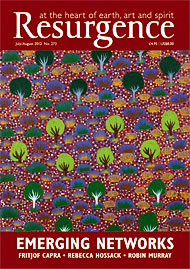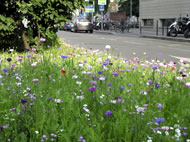The alarming decrease in all insect pollinators, especially bees, could have devastating implications for both wild and farmed plants. Studies have shown that bees and wild flowers are declining in step with one another, and since a massive 3 million hectares of flower-rich grassland has been lost in the UK since 1945, this reduction in biodiversity is deemed one of the main factors influencing the decline of bees, as are virulent new diseases and the use of more pervasive pesticides.
To help address this diminishing biodiversity, a new social enterprise, River of Flowers, aims to create “streams of forage” in city spaces for the benefit of pollinators, plants and people. River of Flowers encourages communities to plant new wild-flower habitats and link to existing ones, facilitated by online mapping tools that help connect the urban flower ‘streams’ into ‘rivers’.
The University of Bristol is undertaking a UK-wide survey to provide a snapshot of the number of insect pollinators that can be found in urban areas in comparison to farmland habitats and nature reserves. Predictions are that cities will prove to be an unlikely haven for essential pollinating insects. Similarly, studies by the charity Landlife – which promotes the planting of wild flowers in derelict industrial spaces – show the positive impact of planting connecting corridors of nectar-rich food for invertebrates by seeding the streets, verges, parks and other urban areas with wild flowers.
Richard Scott of Landlife says: “The buzzing of insects is increasingly audible amidst reclaimed land, where up to eight different types of bumblebee have been counted in a square metre.” Meanwhile, nectar-rich wild flowers are being planted in Dungeness, Kent, in preparation for the return of the short-haired bumblebee, which thrived there until its disappearance 20 years ago.
Working ‘from the ground up’ with communities, schools, hospitals, libraries and ‘Friends’ groups in London and beyond, River of Flowers is proactively stimulating urban meadow creation. This summer they are set to participate in some exciting events throughout London, showcasing their Pop-Up Meadows at the City of London Festival, London Permaculture Festival, and Green Fair, amongst others.
Pop-Up Meadows are one way in which River of Flowers is introducing a colourful flow of urban wild flowers to the concrete jungle. Each Pop-Up Meadow is made of nine tiny urban meadow kits of gorgeous meadow flowers in recycled and biodegradable boxes, which are given away after their appearance at an event so that they can be planted by primary schools and other groups, in parks, community gardens or any small space available.
Lorna Howarth is Development Director at Artists Project Earth, www.apeuk.org







